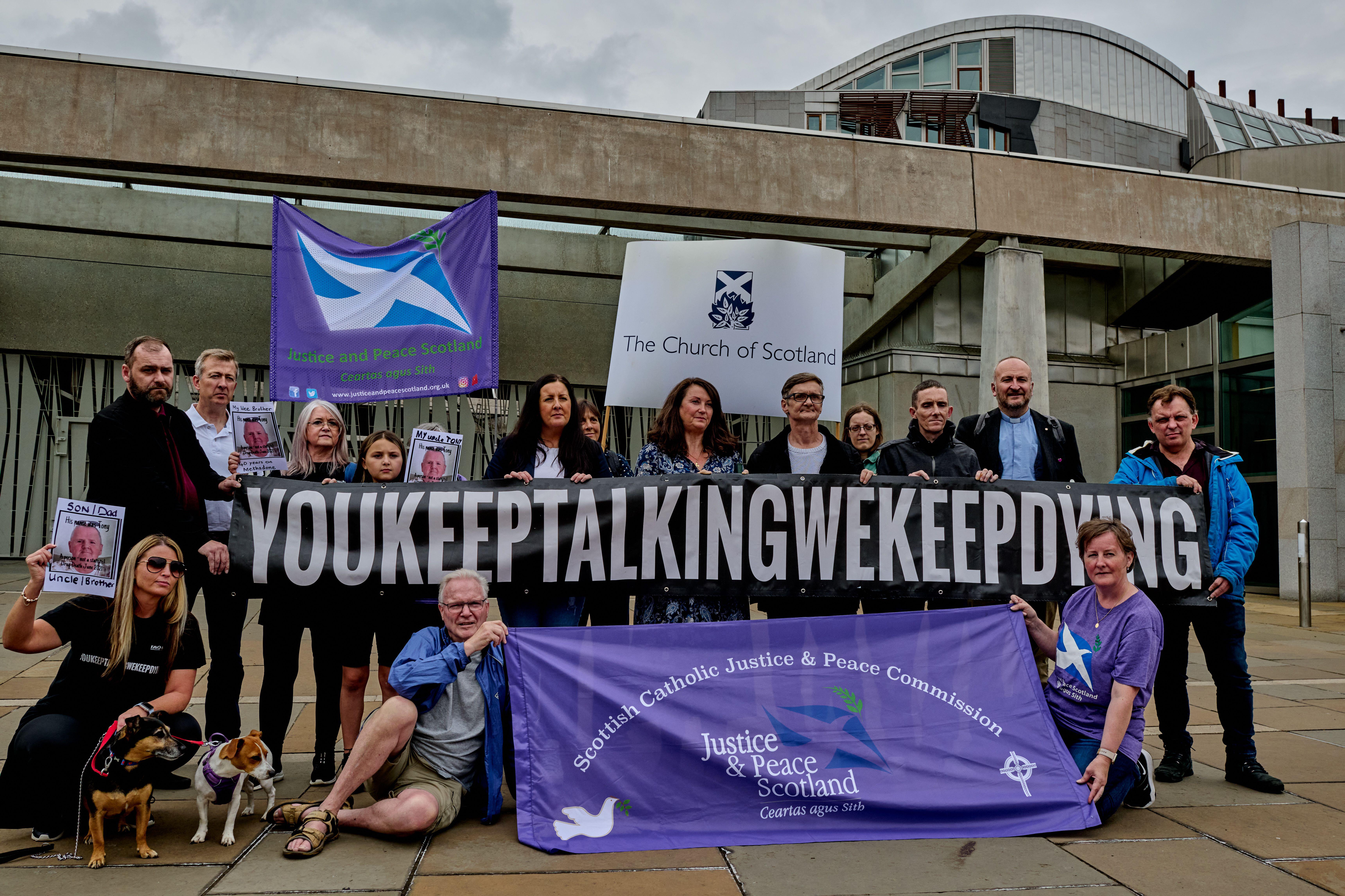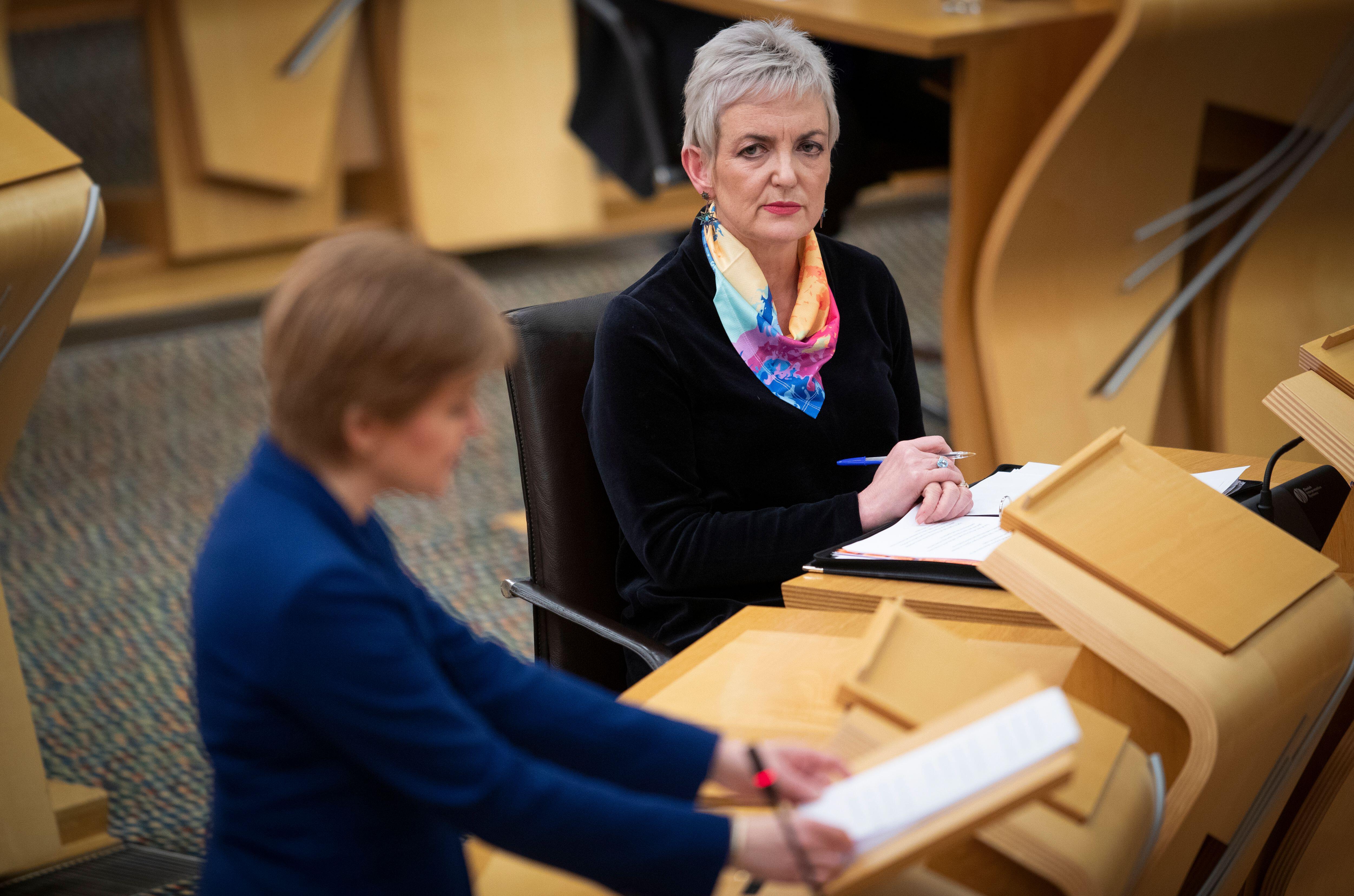Despite political will, progress has been painfully slow on tackling Scotland's drug-death crisis
Sandra Holmes’ daughter was just 12 years old when she took an overdose of paracetamol. It was the beginning of a descent into drug use to help medicate the impact of childhood trauma that would lead to cannabis, ecstasy and, eventually, heroin.
As her health continued to deteriorate, she spent a period in intensive care as her mum desperately sought the help that would save her daughter’s life.
Decades on from when their problems first began and with her daughter in recovery, Holmes is now a member of the Scottish Government’s national mission oversight group, one of a small number of those with “lived experience” who sit alongside doctors, academics, lawyers and a former chief constable.
“I fought to save my daughter’s life, and I did save her life,” she says. “The first time she asked for and wanted help, she was in her 20s. She had approached the services and there was a two-year waiting list to be seen. She was told to carry on using while she waited on the appointment. It was bizarre.”
Holmes set up the group Families Campaign for Change and is now a staunch advocate not only of finding a solution to Scotland’s drugs crisis but ending the stigmatisation of those suffering with addiction.
Yet her fight for her daughter, and others like her, had gone largely unnoticed by Scotland’s political class until fairly recently. That was until a succession of grim statistics on drug-related deaths shocked the country and forced the government, belatedly, into action.
In 2020, 1,339 people between the ages of 15 and 64 lost their lives to drugs – the highest figure ever recorded. In the same year, the first of the pandemic, less than half that number in the same age bracket died as a result of Covid in Scotland.
Scots are now more than three-and-a-half times more likely to die due to drugs than those living elsewhere in the UK. Indeed, according to some analyses, Scotland has the highest rate of drug-related deaths of any country in the world except the United States, which has been battling an opioid crisis in recent years.

During a televised leaders debate in the run-up to the 2021 Holyrood election, First Minister Nicola Sturgeon admitted she had taken her “eye off the ball”.
Since the 2020 data was published, the figures have improved but only marginally. In 2021, 1,330 people died – nine fewer than the previous year. The latest figures will be published by the National Records of Scotland (NRS) in July, but while there’s optimism the death toll may have peaked, there’s little expectation that the situation will have changed dramatically for the better.
Figures published earlier this month based on information from Police Scotland – usually a good indication of the NRS statistics to come later in the year – show there were 1,092 suspected drug deaths in 2022 – down 16 per cent on the previous year. However, the 295 deaths recorded between October and the end of December was the biggest figure since the second quarter of 2021.
“I don’t think things will be worse than they were last year,” says Andrew McAuley, an epidemiologist at Public Health Scotland. “The figures might come down a bit more again, but I still think they’ll comfortably be over a thousand and the rate will still comfortably exceed anything we see in the UK or Europe…”
Assessing why the situation is so much worse in Scotland than elsewhere in the UK is complex. Last year, McAuley and colleagues published a paper which identified what they called the five Ps: poverty, policy, population, prescribing, and polydrug use.
‘Policy’ is perhaps the most controversial of the five given it relates not to long-term issues of population health but to decisions made by politicians. One high-profile example of that was the decision by the Scottish Government in 2015 to cut funding to Alcohol and Drug Partnerships (ADPs) despite dire warnings about what the impact would be.
“Funding was cut through the [UK Government’s] austerity programme which has had a big issue across the whole of the country,” says McAuley. “But then Scotland compounded that with its own additional funding cut in 2015/16 when there was another huge chunk of money taken out of the sector.
“That was right at the time when drug-related deaths were really beginning to accelerate away from the rest of the UK. Our response was to take more money out which was just baffling and really was a contributor to what we’ve seen.”
When it became clear the government had lost control of the issue, Sturgeon sacked her drugs minister, Joe FitzPatrick, replacing him a new minister for drugs policy, Angela Constance, in December 2020. Last year, a taskforce which had been established under Constance’s predecessor published its final report, calling for an overhaul of addiction services and the reform of existing drugs laws.
Its recommendations included establishing the world’s most extensive network for the overdose reversal drug Naloxone; setting up drug consumption rooms; and implementing new treatment standards so that people are able to begin treatment on the day they first ask for it.
But MSPs on the Scottish Parliament’s criminal justice committee last week heard that things aren’t moving quickly enough. Kirsten Horsburgh, director of operations at the Scottish Drugs Forum, told the committee: “It’s too slow. We still hear from people with lived experience that they’re not getting access to the treatment they need on the day they present.”
And she told MSPs there was no reason to delay any further the rollout of safe consumption facilities, despite concerns about them contravening drugs laws reserved to Westminster.
“We need to be making bold, brave, substantial changes that will make real changes to the outcome of people’s lives, rather than looking back and regretting what we could have and should have done,” she told MSPs.
Holmes says progress is being made, but admits things aren’t moving as quickly as they need to. “I know a lot of people who have died,” she says.
“Things are changing and I know the work that’s getting done, but it’s going to take time. There’s been 50 years of failed drug policy – there’s no quick solution to that, and I’m saying that as someone who has been to hell and back as the mother of someone with an addiction.”
Perhaps the most intractable problem when it comes to tackling drug deaths – and one that both Kate Forbes and Humza Yousaf have identified as their top priority should they become first minister – is poverty. In the country’s most deprived areas, there were more than 68 deaths per 100,000 population in 2020 – 18 times as high as in the least deprived areas.

A 2019 investigation by the Scottish Affairs Committee at Westminster, which took evidence from a range of experts, concluded that poverty and deprivation was the single biggest structural driver of problem drug use. The MPs heard evidence from NHS Health Scotland which said drug use disorders were 17 times more prevalent in the country’s most deprived areas, compared with the least deprived.
And while poverty is not necessarily a driver in itself of problematic drug use, those living in the most deprived areas were more likely to be exposed to additional risk factors such as an unstable home life, unemployment, and childhood trauma.
While noting that problems of deprivation and childhood trauma also exist elsewhere in the UK, the committee report found that the proportion of those at risk of overdose who are engaged with drug treatment services in Scotland is far lower than in neighbouring countries. In Scotland, around 40 per cent of people with drug problems are in treatment, compared with around 65 per cent in England and more than 70 per cent in Norway.
During the recent SNP leadership contest, all three candidates gave a qualified backing to the Scottish Conservatives’ Right to Recovery bill which seeks to enshrine in law the right of everyone with addiction problems to receive the treatment they need.
It was a hopeful sign that in the increasingly fractured and partisan world of Holyrood politics, a consensus can be found to tackle one of the most serious and peculiarly Scottish problems the country faces.
“Politics is politics and people will say things for votes and because they have been pressured into doing so, but I think it was a significant moment when Nicola Sturgeon said she had taken her eye of the ball,” McAuley says.
“It was the first time the government conceded they were part of the problem. There had been lots of reasons and excuses given, things like ageing cohorts [of drug users] which have largely been debunked. There is a recognition of the problem now.
“It will be interesting to see who the new [SNP] leader is and whether they prioritise it in the same way…People don’t like to hear this, but it’s not going to be solved overnight. You can’t have an epidemic which is 20 to 30 years in the making, and then solve it overnight. It’s going to take time, and it’s going to take money but there are some encouraging signs in the data.”
Holmes, whose daughter is now happy and healthy after years of destructive drug use, is among those taking part in a conference this week at Stirling University. Families on the Frontline will bring relatives together with those delivering and influencing drug treatment. Constance will also be in attendance.
“We need time – it’s not going to be a quick fix,” Holmes says. “This is not about blaming anyone, it’s about working together. Working together to save lives.”
Holyrood Newsletters
Holyrood provides comprehensive coverage of Scottish politics, offering award-winning reporting and analysis: Subscribe